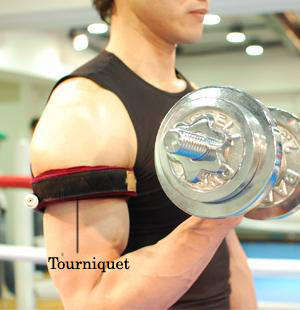Interesting article. I do wonder how one would use occlusion for muscle groups such as Pecs or Lats? Also, I am assuming that one would experience strength increases since the are hitting Type II fibers?
How Does Occlusion Training Work In Increasing muscle?
May 19 2009
Can we use lights weights and still grow big muscles? It seems you can with occlusion training. Now let’s learn more about occlusion training?

What is Occlusion Training?
Occlusion training involves partially restricting (occluding) the blood flow to the muscle when you are lifting weights by using a tourniquet cuff.
Why has Occlusion Training become so popular?
Lighter Weights: For muscle growth, you need to use heavy weights (> 65% of your 1RM). However, occlusion training with lighter weights (20 -50% of 1RM) has shown to achieve muscle & strength gains comparable to conventional training with heavier weights (around 80% 1RM).
Rehabilitation: Heavier weights are not recommended when you are recovering from injury. Occlusion training improves strength and muscle gains with lighter weights which is beneficial for rehabbing injuries.
Studies: Number of scientific studies have confirmed the above results with occlusion training.
So how does Occlusion Training increase muscle growth?
The major factors that could explain muscle growth with occlusion training are:
Recruitment of Type 2 Fibers: Muscles are made of two types of fibers: Type 2 & Type 1 fibers. Type 2 fibers are the ones which grow easily and make you look big. But Type 2 fibers are only recruited when you go to failure or when you use heavy weights (>80% 1RM).
When lighter loads are combined with occlusion, Type 2 fibers are recruited way early in the set just like when you are doing a heavier weight. So they get naturally bigger.
Increase in Growth Hormone: Lighter loads with occlusion training have shown to increase GH levels more than heavy training. But recent evidences have shown increases in GH not to have much benefit for muscle growth.
Metabolic Accumulation: The accumulation of metabolites like lactic acid, hydrogen in the muscle (causes the burn) due to blood flow restriction ( as in occlusion training) may help in increasing muscle growth. But we are not sure.
Practical Application
The muscle is usually occluded when you are using heavier weights (> 60% of1RM). But you can occlude or reduce blood flow a bit more with some other techniques.
- Not relaxing the muscle throughout the set. Or maintain the tension thought the muscle by doing partial movements and/or contracting them hard.
- Keeping rest time between sets short
- Doing a drop set with lighter weights after your heavy set. When you use heavy weight, you are recruiting ALL your fibers from the very first rep.So a drop set can give you some metabolic build up (the burn) which may help in muscle growth.
- Occluding the muscles for more than 5-10 minutes with tourniquets can cause serious muscle damage.
Related Articles
Jim
By eliminates the lockouts, slow tempo, flexing the muscles all the time you might have almost the same effect.
Anoop | Fri May 22, 2009
Thanks Jim
Yes. strength increases have been noted too.
If you look at practices like super setting, keeping rest time below 30 sec, drop sets, rest pause, you see that everything is basically trying to increase metabolic fatigue and thereby increasing Type 2 fiber recruitment.
I guess for muscle like chest and lats , you can pretty much do the same: contract them, keep rest time short, or do drop sets. I guess all that focus and contracting them is helping via the recruitment. And who knows there might be some effect of metabolic build up too.
There was a study recently which looked at intesnity and protein synthesis. And what they found out was at 60%, 75%, & 90% the protein synthesis was the same. But it was on beginners. I guess it goes back to recruitment.But in advanced recruitment might not be enough.
Anoop, do you think that this kind of training appropriate for someone with heart problems such as high blood pressure?
Thanks
Anoop | Tue April 05, 2011
I would stay away from these training for people who have heart problems.
And occlusion training in the study used a tourniquet. I don’t think many people will try this option.
Occlusion training works. I am training a 45 year old lady that started out at 112 pound and deadlifting 105 pounds. Going on her seventh week, she is at 134 pounds maxed out at 245 pounds on the deadlift.
It took a few times to figure out the correct wrap/tightness and timing but once that was done…huge gains.
near60lifter | Sun June 19, 2011
Can occlusion also be produced by using a “tonic” cadence? http://jap.physiology.org/content/100/4/1150.Effects of low-intensity resistance exercise with slow movement and tonic force generation on muscular function in young men
Michiya Tanimoto and Naokata Ishii
Department of Life Sciences, Graduate School of Arts and Sciences, University of Tokyo, Meguro-ku, Tokyo, Japan
near60lifter - obviously yes. there are few ways to accomplish near occlusion effect
poochie man | Mon September 10, 2012
Beware if ya have high blood pressure (HBP), man this is nuts…try 2 apply a “torniquette” 2 yer neck and try 2 memorize
some russian sentences at the same time..I will repeat it DeeZ eeZ BAH NAH NAS!!!! :O
It´s mnothing new - and it´s old Japan Method - Kaatsu Training - search for it.





